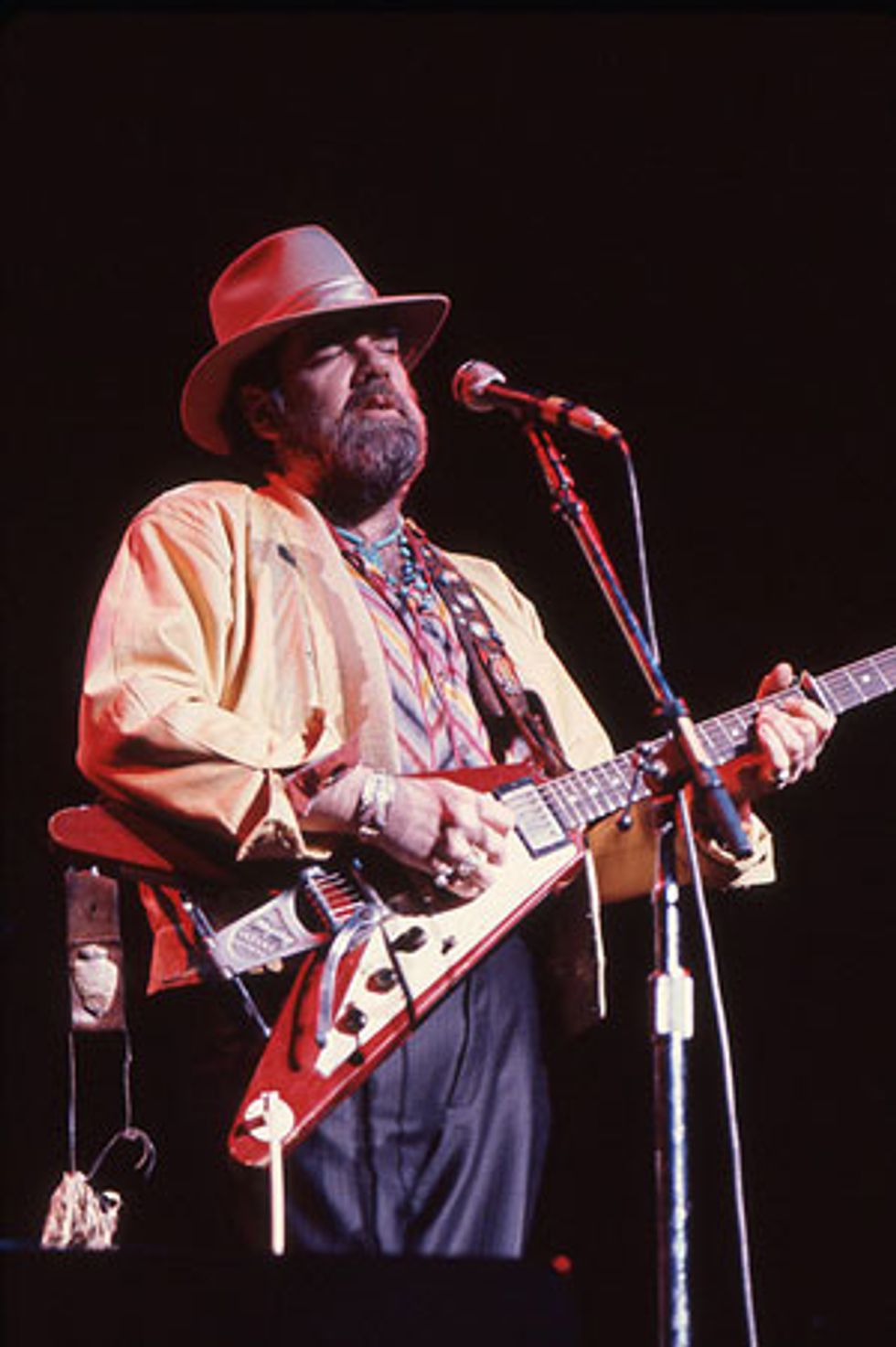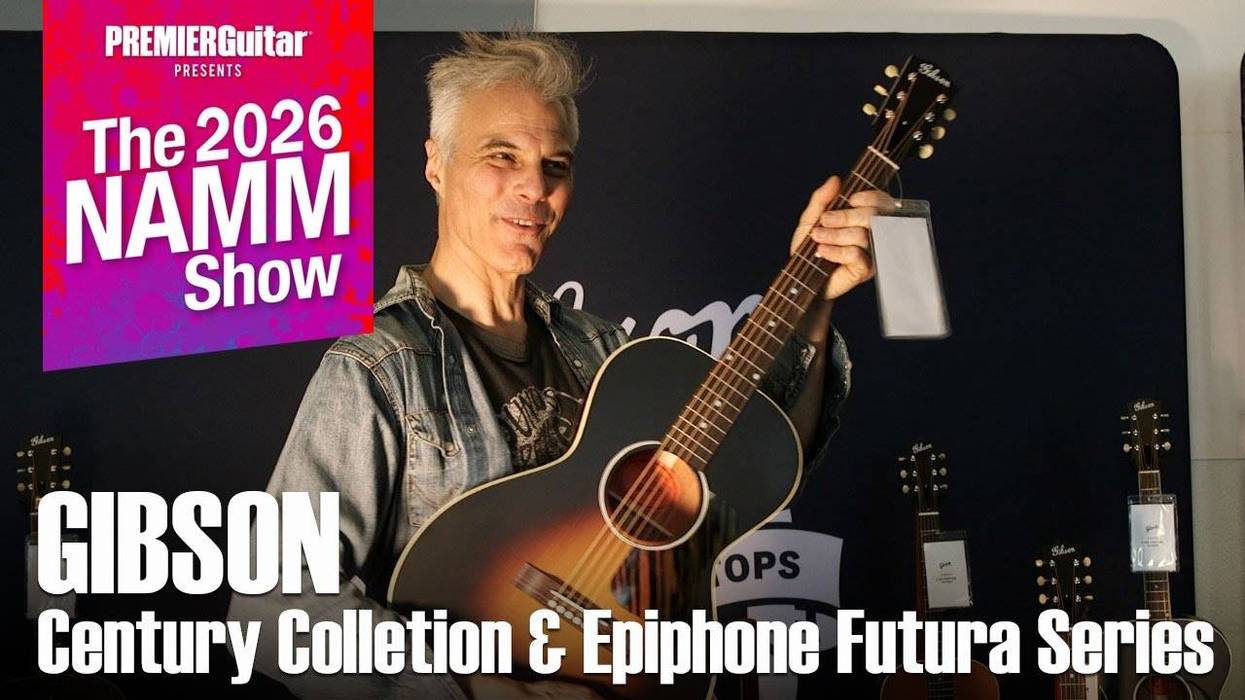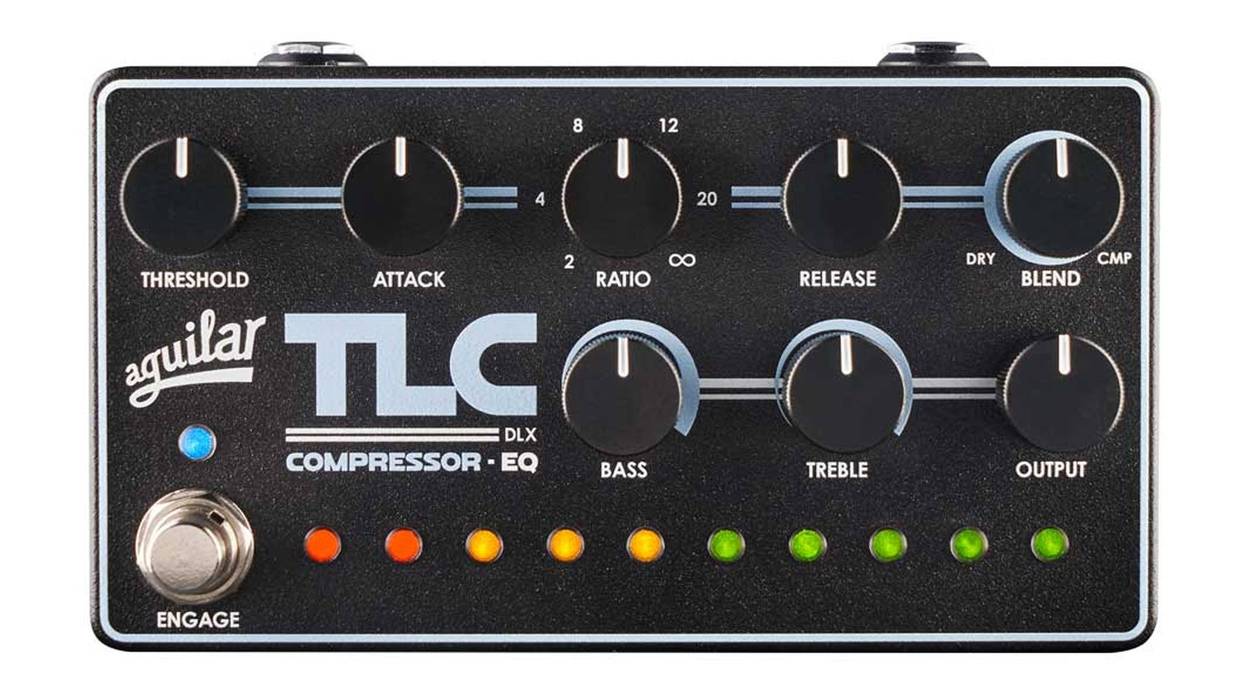Lonnie Mack described his music as “a little bit of everything. There’s county, blues, rock ’n’ roll, all the way down to some bluegrass and a little Cajun with some uptown jazzy stuff mixed in.” No matter the genre, it was clear that Mack, who was born Lonnie McIntosh in West Harrison, Indiana, on July 18, 1941, was a guitarist’s guitarist. His first two singles, 1963’s “Memphis” and “Wham!,” laid the groundwork for blues-rock and influenced generations of players, including Eric Clapton, Jimmy Page, Jeff Beck, Duane Allman, Dickey Betts, and, most notably, Stevie Ray Vaughan, who co-produced Mack’s 1985 comeback album, Strike Like Lightning.
Mack, who died on April 21 at age 74, grew up listening to the Grand Ole Opry on the radio as well as the day’s other musical fare, ranging from Les Paul to Hank Williams to Jimmy Reed to Ray Charles to T-Bone Walker to Chuck Berry to the Five Blind Boys to Robert Ward. From that varied menu, Mack pulled the elements of his own sound together when he began to form bands to play Indiana, Ohio, and Kentucky roadhouses in the mid-to-late 1950s.
Early on he played Stratocasters and Telecasters, but moved to the Les Paul for its warmer sound. When the Gibson Flying V came out in 1958, Mack was hooked on its modern look and stout tone, and purchased the seventh V that came out of the factory. There’s plenty of lore around Mack’s distinctive Flying V, which was rigged with a Bigsby vibrato arm that required a metal cross-rod to bridge the V’s wings as an anchor. Although most accounts relate that Mack had the guitar modded after he bought it, he told me in 1985 that it was already installed when he purchased the guitar.
“What I wanted was the weirdest guitar I could find,” he said when we spoke in 1985 backstage at Jonathan Swift’s, a now long-gone club in Cambridge, Massachusetts, during his first national tour in more than a decade. “I wanted something that would look hip onstage.” It certainly did, and Mack’s fat sound made the distinctive instrument even cooler. He played through a Magnatone amp turned way up and strung his instrument with heavy gauge Gibson 340 strings: .013–.056.
In the early 1960s, Mack was playing sessions for the Fraternity label in Cincinnati. He backed James Brown, Freddie King, and Hank Ballard among others in the studio. At the end of a 1963 session for the Charmaines backed by Mack and his band, a 20-minute block of studio time remained. The label offered to record Mack’s outfit, so they played an instrumental version of the Chuck Berry hit “Memphis, Tennessee,” which was well received on their club dates. By late June that recording was No. 4 on Billboard’s R&B chart and No. 5 on the pop chart. Although “Memphis” seemed to follow a guitar lineage defined by Berry’s playing and that of early rockabilly outfits like Johnny Burnette’s Rock ’n’ Roll Trio, the follow-up, “Wham!,” was Mack’s first major artistic statement and captured the birth of his signature tone.
While many amps of the day had a “vibrato” function, most of these were actually tremolo circuits. Mack’s Magnatone truly employed vibrato, which he jacked up high for “Wham!,” and then applied his own distinctive mix of fast chording and melody picking, with his Bigsby also playing a role to create the tune’s undulating waves of sounds. That trademark sound echoed in his classic follow-ups, including an instrumental version of “Susie Q” and the fleet-fingered “Chicken Pickin’,” which inspired Vaughan’s signature instrumental “Scuttle Buttin’.”

Mack plays his Flying V during a concert at LIU Post in Brookville, New York, in 1987 during his Alligator Records years. Photo by John T. Comerford III/Frank White Photo Agency
The label soon discovered Mack was also a soulful singer and began cutting a series of Mack’s vocal ballads that received wide airplay throughout the South, including “Where There’s a Will” and “Why,” where Mack’s guitar evoked the lines of a church organ in the verses. Rock critic Greil Marcus called Mack’s performance of “Why” “so torturous, so classically structured, that it can uncover wounds of your own.” Many who heard these songs on the radio, as well as plenty of the DJs who played them, thought Mack was African-American. When a significant number of those jocks discovered he wasn’t, they stopped playing his singles, effectively embargoing his material from stations in the deep South.
Mack’s career-building hits were collected by Fraternity on the 1964 album The Wham of that Memphis Man. When Fraternity was sold, Mack found himself without a label for several years until Elektra Records stepped in. He cut three albums for Elektra between 1969 and 1971, and did session work. His most famous studio gig during that period was on the Doors’ 1969 Morrison Hotel. Mack contributed the driving bass line to “Roadhouse Blues.” “That was cut on a crazy night,” Mack recalled. “Morrison came in all drunk—he told us he’d been out fighting Mexicans—and he’d stop in the middle of takes and holler, ‘Hey, time this,’ and chug a beer.”
Mack also took an A&R job at the Elektra, but resigned after the label resisted his efforts to sign Carole King and gospel singer Dorothy Combs Morrison. He returned to Indiana and recorded several country albums that slid into obscurity. He also returned to playing the region’s roadhouses—where he would largely remain until the 1980s, when he relocated to Texas. There, he met acolyte Stevie Ray Vaughan and they began collaborating on music that led to Mack’s signing with Alligator Records in 1984. Vaughan played on much of the resulting Strike Like Lightning album, including the acoustic guitar duet “Oreo Cookie Blues,” about the diabetes-afflicted Mack’s junkie-like taste for sweets.
Mack crisscrossed the world during that period, but often found himself playing in his Indiana, Ohio, and Kentucky stronghold. Mark Robinson, a Nashville-based producer and guitarist who lived in Bloomington, Indiana, in the late ’80s, witnessed many of Mack’s local performances and got to know the bear-sized guitarist and played with him.
“He was playing through two big Magnatone amps,” Robinson recalls. “They were really loud! The vibrato on those amps created a big watery, rolling surf sound. Really different than other amps. His choice of gear clearly had a lot to do with his sound, which was unique.
“Lonnie was a country boy, and talked more about fishing and farming than he did about guitar playing or music, but he clearly had a deep well of knowledge about all kinds of music,” Robinson continues. “He could sing and play just about any song you could think of. As a bandleader, he was clearly in charge, but his band was excellent and well rehearsed, so he basically called the shots and they delivered. Lonnie and his band were really kind to me, as were a lot of my musical heroes—and that stuck with me. I’ve always tried to be as generous with younger musicians as Lonnie was to me.”
YouTube It
If you’ve heard Stevie Ray Vaughan’s “Scuttle Buttin’,” the similarities between it and Mack’s “Chicken Pickin’” are undeniable, from the lightning melody licks to the chords, providing relief from the furious picking, to the song’s finale. Jeff Beck’s “Beck’s Boogie,” his showcase from his Yardbirds era, is also a deliberate nod to Mack.
Mack was quirky, in the way of many creative people. Reportedly, when he cut his final album for Elektra in Nashville, he brought his family with him and they camped out in the studio’s parking lot in a former school bus, with a hole cut in its ceiling to accommodate a wood stove. Not surprisingly, he was also an excellent raconteur whose tales sometimes seemed to slightly shift their dimensions when retold. Along those lines, the story of being shot by in the knee by a policeman in Cincinnati, immortalized in his song “Cincinnati Jail,” had morphed into something else when we discussed the tune.
“I was shot in the ass by an off-duty detective,” he said. “Another inch-and-a-half and I would have been singing soprano. The bullet went right through. I was walking down the street and these guys were acting drunk and crazy in their car. I had a big machete I was going to trade with a friend—I trade and collect knives—and I had to jump out of the way to keep them from hitting me. As they went by I hollered at them and sort of chopped the trunk with the knife and put a big gash in it. The guy jumped out and shot me. And they put me in the Cincinnati jail.”
Strike Like Lightning, two more albums for Alligator, and one for Epic Records gave Mack what was essentially a third wind, propelling him on global tours until the early 2000s, when diabetes and worsening general health caused him to semi-retire. He relocated to a farm in Smithville, Tennessee, about an hour east of Nashville. Mack died at a hospital near his home, from natural causes.


















![Rig Rundown: Russian Circles’ Mike Sullivan [2025]](https://www.premierguitar.com/media-library/youtube.jpg?id=62303631&width=1245&height=700&quality=70&coordinates=0%2C0%2C0%2C0)
















![Rig Rundown: AFI [2025]](https://www.premierguitar.com/media-library/youtube.jpg?id=62064741&width=1245&height=700&quality=70&coordinates=0%2C0%2C0%2C0)











